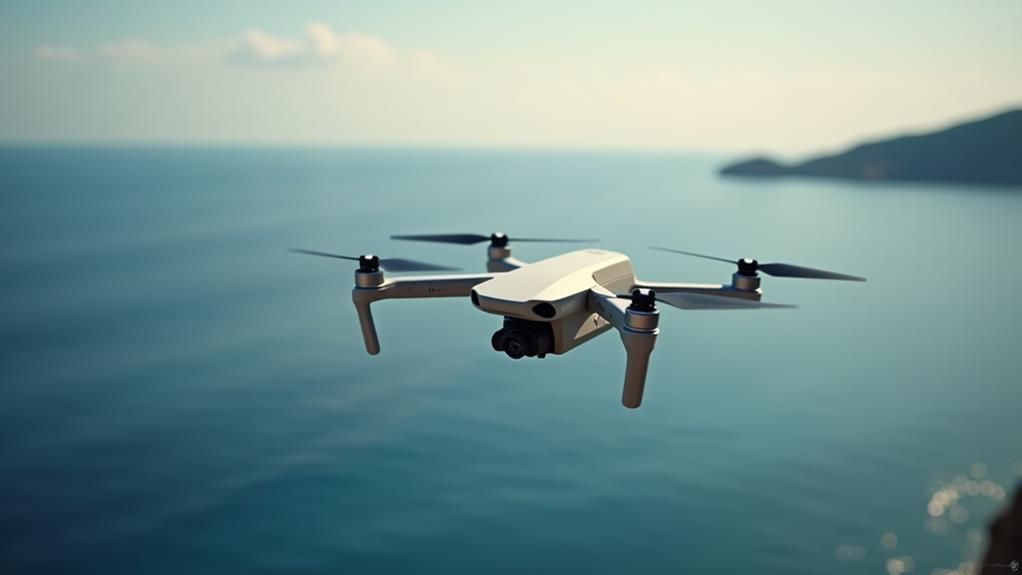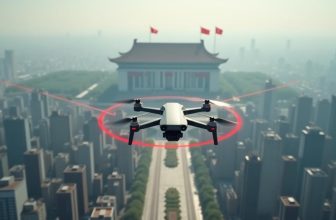
If you're planning to fly a drone in Croatia, you'll need to navigate the country's regulations and laws. You'll have to register your drone, obtain certification through a CCAA-approved training program, and follow strict safety and security rules. But what exactly are the specifics of these requirements, and how will they impact your flight plans? For instance, what zones are completely off-limits, and what are the consequences of non-compliance? Understanding Croatia's drone laws is vital to avoid fines and even jail time – let's take a closer look at what you need to know to fly safely and responsibly.
Contents
Key Takeaways
- Drone registration in Croatia costs 200 HRK for 2 years and requires renewal every 2 years.
- Pilot certification involves a training program, theoretical exam, and practical flight test approved by the CCAA.
- Drone flights are restricted in zones like airport boundaries, national parks, and military areas without prior approval.
- Maintaining a visual line of sight with the drone and establishing emergency procedures are essential safety rules.
- Non-compliance with Croatia's drone regulations can result in fines up to 50,000 HRK and jail terms up to two years.
Drone Registration Requirements
The registration fee is 200 HRK (approximately 26 EUR) for a period of 2 years.
Payment can be made online or by bank transfer. Note that you'll need to renew your registration every 2 years.
Additionally, you should consider purchasing drone insurance options, which can provide coverage for damages or losses incurred while operating your drone.
Drone insurance policies can vary depending on the provider and the level of coverage you require. You should carefully review your policy options to verify you have adequate coverage for your drone.
Permissions and Licenses
To operate a drone in Croatia, you'll need to obtain the necessary permissions and licenses from the Croatian Civil Aviation Agency (CCAA).
These requirements apply to both recreational and commercial drone pilots, and failure to comply can result in penalties and fines.
To obtain the necessary permissions and licenses, you'll need to meet the following requirements:
1. Pilot Certification: You'll need to hold a valid drone pilot certification, which requires completing a training program approved by the CCAA.
The certification process involves passing a theoretical exam and a practical flight test.
2. Drone Insurance: You'll need to have liability insurance that covers damages to people and property.
The insurance policy must meet the minimum requirements set by the CCAA.
3. Operational Approval: You'll need to obtain operational approval from the CCAA, which involves submitting a detailed flight plan and obtaining permission to fly in a specific area.
It's essential to note that the CCAA may require additional documentation and information, depending on the specific circumstances of your drone operation.
You should carefully review the CCAA's requirements and verify you comply with all regulations before operating a drone in Croatia.
Flight Restrictions and Zones
Croatian airspace is subject to various flight restrictions and zones that you must be aware of before operating a drone.
You're required to observe these restrictions to guarantee the safety of people and property on the ground, as well as the safety of other air traffic.
Airport boundaries are a restricted zone where drone flights are generally prohibited.
You aren't allowed to operate a drone within 1.5 kilometers of airport boundaries, except with prior approval from the airport authority and the Croatian Civil Aviation Agency.
Additionally, National parks are also subject to flight restrictions.
You're required to obtain permission from the park authorities before flying a drone within a National park.
These restrictions are in place to protect the natural environment and wildlife, as well as the safety of visitors.
Other restricted zones include military areas, nature reserves, and areas with temporary restrictions due to events or emergencies.
It's essential to check for up-to-date information on restricted zones before flying a drone in Croatia to guarantee compliance with the regulations.
Safety and Security Rules
When operating a drone in Croatia, you must follow specific safety and security rules to guarantee a safe flight.
You're required to maintain a visual line of sight with your drone, and you must be aware of restricted flight zones to avoid potential hazards.
In case of an emergency, you must have established emergency procedures in place to respond effectively.
Visual Line of Sight
Your drone must remain within your visual line of sight at all times.
This means you must be able to see your drone with your own eyes at all times during flight, without relying on binoculars, goggles, or other vision-enhancing devices.
This rule is in place to certify you can quickly respond to any potential hazards or emergencies that may arise during flight.
As a drone pilot, it's essential you receive proper pilot training to understand how to maintain visual line of sight and respond to emergency situations.
Additionally, you should conduct a visual inspection of your drone before each flight to confirm it's in good working condition.
- Weather conditions: Avoid flying in low-visibility conditions, such as heavy fog or thick clouds.
- Obstacles: Be aware of obstacles in your surroundings, such as trees, buildings, or power lines.
- Drone performance: Understand your drone's performance capabilities and limitations to avoid losing visual line of sight.
Restricted Flight Zones
Piloting a drone in certain areas of Croatia can pose significant safety and security risks.
As you plan your drone operations, you'll need to be aware of restricted flight zones that are off-limits or subject to special regulations.
These areas include national parks, which are protected by Croatian law, and military bases, where unauthorized drone activity can compromise national security.
You're not allowed to fly your drone over national parks, including Plitvice Lakes National Park and Krka National Park, without prior permission from the park authorities.
Additionally, you must maintain a safe distance from military bases, which are clearly marked on aeronautical charts and maps.
You can check the Croatian Civil Aviation Agency's website for up-to-date information on restricted areas and any necessary permits or authorizations.
It's your responsibility to respect these restrictions and plan your flights accordingly.
Failure to comply can result in fines or other penalties.
Always check the latest information on restricted flight zones before flying your drone in Croatia to guarantee a safe and enjoyable experience.
Emergency Procedures
In addition to respecting restricted flight zones, you must also be prepared for unexpected situations that may arise during drone operations in Croatia.
As a responsible drone operator, it's vital to have a plan in place for emergency procedures to guarantee safety and security.
In Croatia, emergency response and crisis management are critical components of safe drone operations.
You must be able to respond quickly and effectively in case of an emergency.
Three key considerations for emergency procedures are:
- Establish a communication plan: Designate a contact person and establish a communication protocol for emergency situations, including a phone number and email address.
- Develop a crisis management plan: Create a plan that outlines the steps to take in case of an emergency, including procedures for reporting incidents and cooperating with authorities.
- Conduct regular safety checks: Regularly inspect your drone and equipment to verify they're in good working condition, and conduct safety checks before each flight to minimize the risk of accidents.
Penalties for Non-Compliance
If you fail to comply with Croatia's drone regulations, the Croatian Civil Aviation Agency or other law enforcement authorities will take action.
You may face penalties, including fines and even jail terms, depending on the severity of the offense.
Fines amounts vary depending on the nature of the violation.
For example, operating a drone in a restricted area can result in a fine of up to 50,000 HRK (approximately 6,670 EUR).
If you fail to register your drone or obtain the required permits, you may be fined up to 20,000 HRK (approximately 2,667 EUR).
In more severe cases, jail terms may be imposed.
For instance, if you recklessly endanger the safety of people or aircraft, you can face up to two years in prison.
Operating a drone without a valid license or while under the influence of substances can also result in jail terms of up to one year.
To guarantee a safe and enjoyable drone operation experience, you must verify that you're aware of Croatia's drone regulations to avoid these penalties and confirm a safe and enjoyable drone operation experience.
Recreational Drone Operations
Understanding Croatia's drone regulations is key to a safe and enjoyable flying experience.
As a recreational drone operator, you're required to comply with specific rules to avoid penalties or accidents. It's vital to familiarize yourself with these regulations to guarantee a smooth experience.
Before flying your drone, make sure you:
1. Maintain your drone: Regularly check your drone's condition, verifying all components are functioning correctly.
Perform routine maintenance to prevent malfunctions and secure a safe flight.
2. Obtain drone insurance: Although not mandatory, having drone insurance can protect you from potential damages or injuries caused by your drone.
This can give you peace of mind while flying.
3. Respect airspace restrictions: Be aware of restricted areas, such as national parks, airports, or military zones.
Always check for updates on airspace restrictions before flying.
Frequently Asked Questions
Can I Fly a Drone Over Croatia's National Parks?
When flying a drone over national parks, you'll need to check park restrictions and wilderness rules, as some areas may be no-fly zones or require special permits, ensuring you respect protected environments and follow regulations.
Do I Need Drone Insurance in Croatia?
As you venture into aerial photography, you'll face uncertainties – will you be liable for accidents? In Croatia, yes, you'll need drone insurance to cover potential drone liabilities, a vital step before taking to the skies.
Can I Bring a Drone on a Croatian Ferry?
When bringing a drone on a ferry, you must comply with ferry rules and safety guidelines. Verify your drone is properly secured, and batteries are protected. Inform the ferry staff and follow their instructions to guarantee a safe journey.
Are There Drone Flying Lessons in Croatia?
You're considering drone flying lessons, like many enthusiasts who've taken courses with 'EuroUSC', a European drone training provider, which offers extensive drone courses through partnered flight schools, helping you master safe and efficient flight operations.
Can I Use a Drone for Fishing in Croatia?
When using a drone for fishing, you'll need to weigh coastal restrictions. In Croatia, drone fishing is subject to specific rules; you'll require a permit and must respect no-fly zones near marine protected areas.
Conclusion
You've familiarized yourself with Croatia's drone laws and regulations. Now, you're ready to register your drone, obtain necessary certifications, and navigate restricted zones. You'll maintain a visual line of sight, follow safety rules, and guarantee conformity to avoid penalties. By flying responsibly, you'll respect the country's regulations and preserve the safety of its airspace, people, and environment, just as you would respect the rules of the road and the rights of others.





